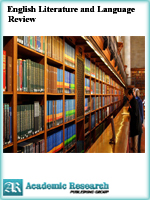English Literature and Language Review
Online ISSN: 2412-1703
Print ISSN: 2413-8827
Print ISSN: 2413-8827
Quarterly Published (4 Issues Per Year)

Archives
Volume 5 Number 8 August 2019
The Analysis of Guide Words About Xiamen Based on Systemic Functional Grammar
Authors: Juanjuan Li ; Lingling Liu ; Huanle Cui
Pages: 151-157
DOI: doi.org/10.32861/ellr.58.151.157
Abstract
With the booming development of tourism, tour-guide English has gradually been favored by many people. Some studies about tour-guide English are increasing. The essay is based on the guide words about Xiamen in the aspect of SFG, especially the five processes of ideational metafunction. The guide words about Xiamen simply introduce some scenic spots including Gulangyu Islet, the Sunlight Temple, memory hall of Zheng Chenggong and so on. The guide words is analyzed through the material process, mental process, relational process, verbal process and existential process so that convey new information to readers and preferably understand English text about guide words.
An Ecological Examination of Student Teachers’ Belief Development During the Teaching Practicum
Authors: Xiaowan Yang
Pages: 140-150
DOI: doi.org/10.32861/ellr.58.140.150
Abstract
Using Bronfenbrenner’s ecological theory of human development as the framework, this study explores how the ecological context of student teachers affect their belief development during the teaching practicum. Findings reveal that during the teaching practicum, student teachers interacted directly or indirectly with their ecological environments, including students, parents, mentors, supervisors, school policies, culture and social trends, which led them to develop, confirm, integrate, discard, or modify their beliefs. Findings also reveal that ecological environments may not only encourage but also impede student teachers’ belief development depending on what kind of influences they exert on them. Lastly, findings suggest that although macrosystem locates the most distant in student teachers’ ecological environments, factors within it may exert a huge influence on other environments and thus have a huge impact on student teachers. Based on the above findings, this study calls upon more opportunities for student teachers to participate in real-world professional practice so that they can put their beliefs to test. More training is also needed for mentors and supervisors to support student teachers’ belief development.
Correlation Between Emotional Intelligence and Code Switching Phenomenon at Bilingual Platform
Authors: Nasim Meskini ; Afsaneh Afra ; Sasan Davari Afshar ; Ismail Baniadam
Pages: 134-139
DOI: doi.org/10.32861/ellr.58.134.139
Abstract
The present study was an attempt to see if there is a relationship between the Emotional Intelligence of the teachers and their attitudes toward Code Switching in Iranian EFL classes. Why some teachers use code switching in an EFL class and some others ignore it, is so challenging at the face of any foreign language class. The population in this study comprised of 140 individuals. To determine the sample size of EFL teachers, total numbering and simple random sampling method were used respectively resulting in the selection of 80 English teachers including 40 female and 40 male teachers. The mother tongue of the participants was Turkish/Persian ranging between the ages of 20 and 30.To collect the required data, first, two types of standard questionnaires were given to the participants; one of the questionnaires encompassing questions about code switching and the other one about the emotional intelligence. The reliability of both questionnaires was already established. According to the obtained results by means of SPSS software, it was shown that there was not any correlation between teachers’ emotional intelligence and code-switching and the educational outcome of EFL students in Iranian context. The results of the present study will pave the way for more accurate EFL classroom conduct and also other factors of the related issues in question could be considered by some other researchers.



